广东省深圳市 Module 4 Unit 8 From hobby to career Listening&speaking 课件 (2)
文档属性
| 名称 | 广东省深圳市 Module 4 Unit 8 From hobby to career Listening&speaking 课件 (2) | 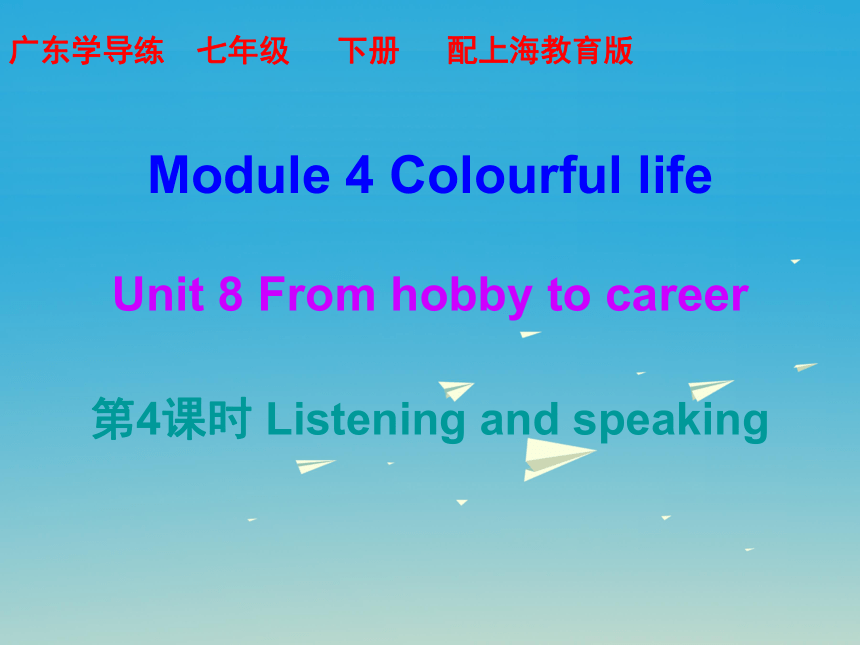 | |
| 格式 | zip | ||
| 文件大小 | 5.2MB | ||
| 资源类型 | 教案 | ||
| 版本资源 | 牛津深圳版 | ||
| 科目 | 英语 | ||
| 更新时间 | 2016-07-19 00:00:00 | ||
图片预览

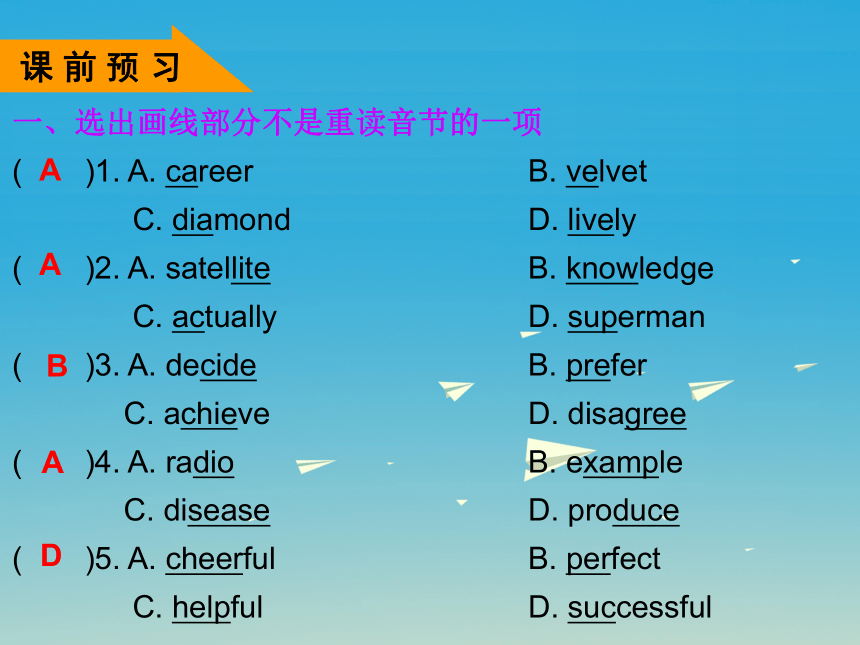

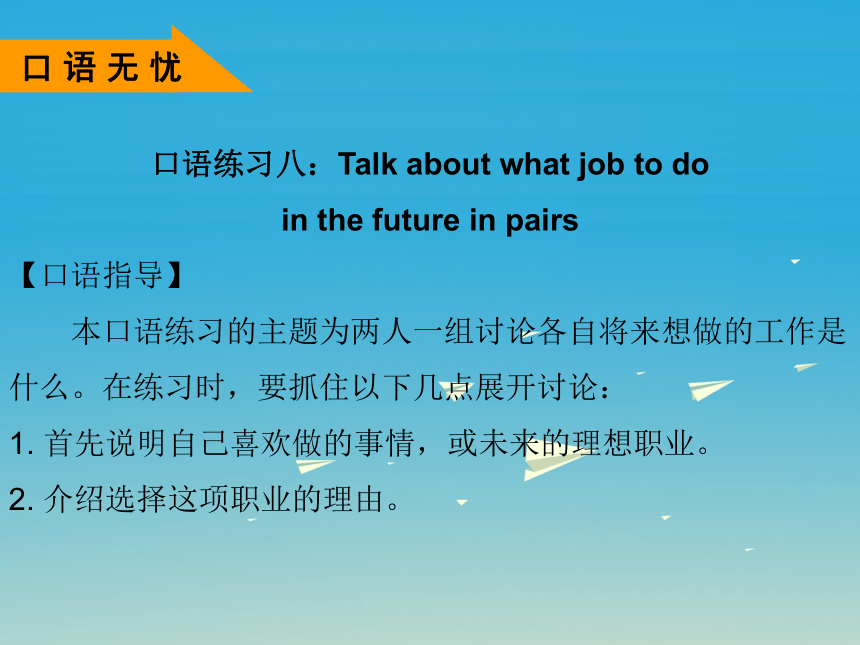
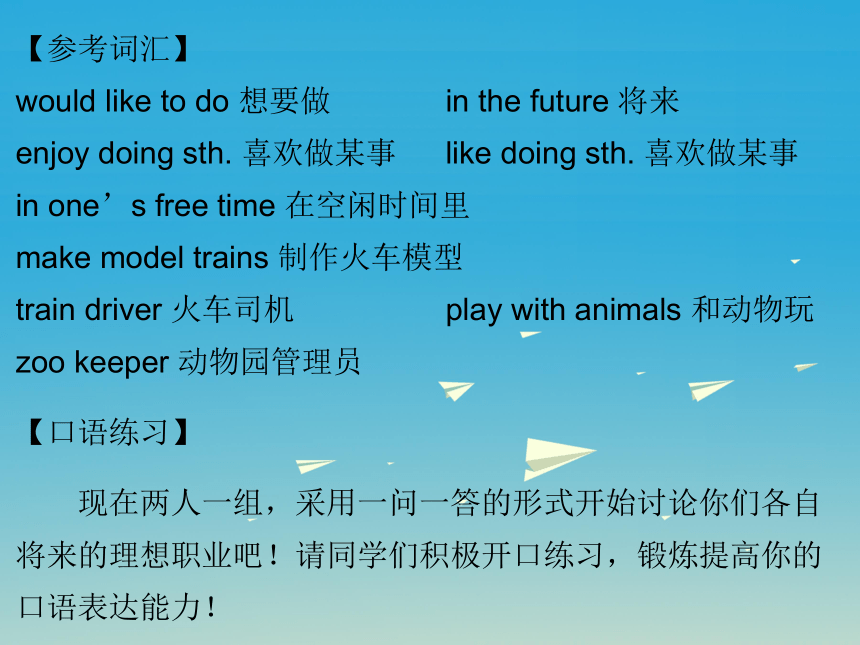
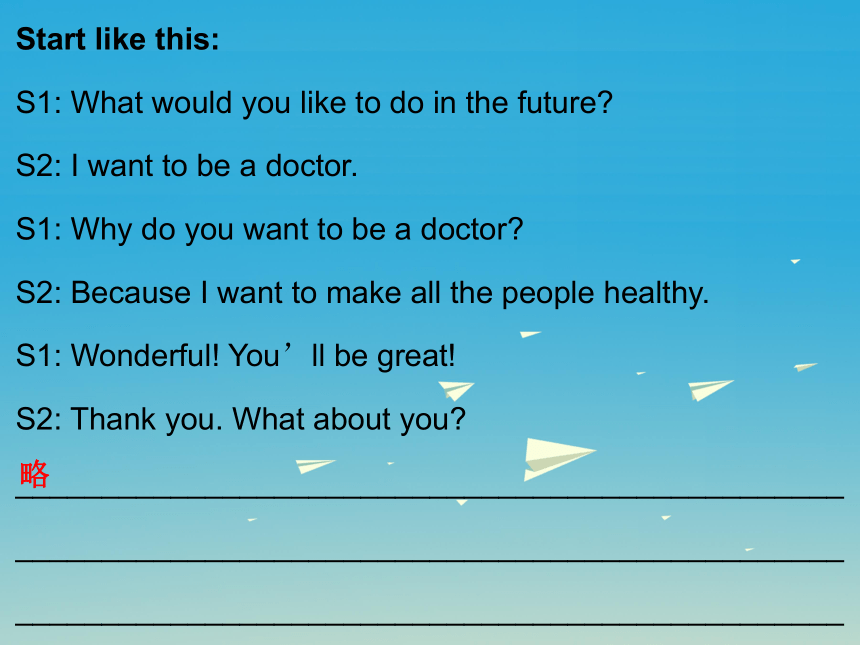
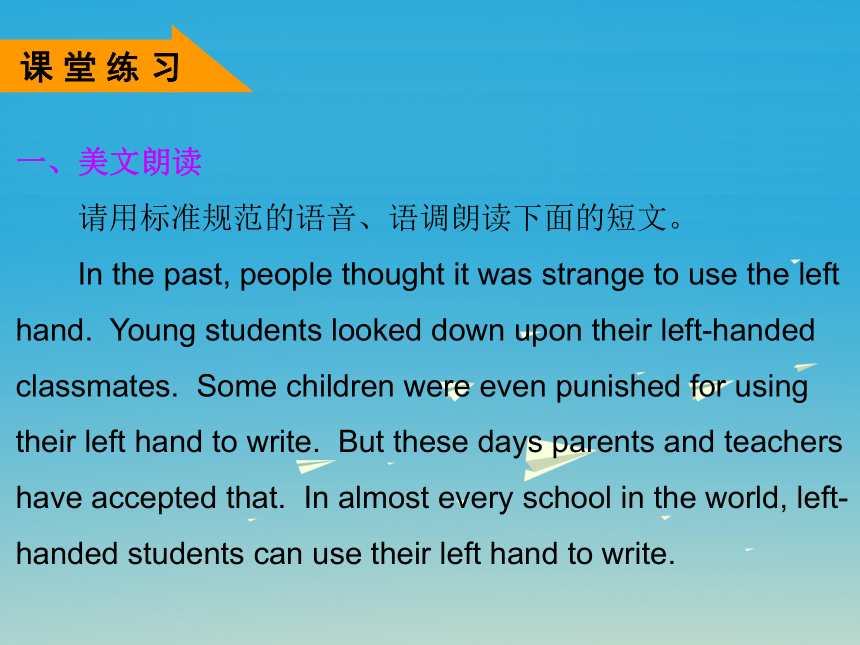
文档简介
课件16张PPT。第4课时 Listening and speakingUnit 8 From hobby to careerModule 4 Colourful life广东学导练 七年级 下册 配上海教育版一、选出画线部分不是重读音节的一项
( )1. A. career B. velvet
C. diamond D. lively
( )2. A. satellite B. knowledge
C. actually D. superman
( )3. A. decide B. prefer
C. achieve D. disagree
( )4. A. radio B. example
C. disease D. produce
( )5. A. cheerful B. perfect
C. helpful D. successfulAABAD二、将下列汉语翻译成英文,然后默读三遍
1. 长大 ____________________
2. 花费时间做某事 ____________________
3. 去进行帆船运动 ____________________
4. 决定做 ____________________
5. 训练成为 ____________________
6. 对……有用 ____________________
7. 对……的理解 ____________________
8. 顺便问一句 ____________________
9. 取得很大进步 ____________________
10. 下周 ____________________grow upspend time doing sth.go sailingdecide to dotrain to bebe useful forthe understanding ofby the waymake good progressnext week口语练习八:Talk about what job to do
in the future in pairs
【口语指导】
本口语练习的主题为两人一组讨论各自将来想做的工作是什么。在练习时,要抓住以下几点展开讨论:
1. 首先说明自己喜欢做的事情,或未来的理想职业。
2. 介绍选择这项职业的理由。【参考词汇】
would like to do 想要做 in the future 将来
enjoy doing sth. 喜欢做某事 like doing sth. 喜欢做某事
in one’s free time 在空闲时间里
make model trains 制作火车模型
train driver 火车司机 play with animals 和动物玩
zoo keeper 动物园管理员
【口语练习】
现在两人一组,采用一问一答的形式开始讨论你们各自将来的理想职业吧!请同学们积极开口练习,锻炼提高你的口语表达能力!Start like this:
S1: What would you like to do in the future?
S2: I want to be a doctor.
S1: Why do you want to be a doctor?
S2: Because I want to make all the people healthy.
S1: Wonderful! You’ll be great!
S2: Thank you. What about you?
________________________________________________
________________________________________________
________________________________________________略一、美文朗读
请用标准规范的语音、语调朗读下面的短文。
In the past, people thought it was strange to use the left hand. Young students looked down upon their left-handed classmates. Some children were even punished for using their left hand to write. But these days parents and teachers have accepted that. In almost every school in the world, left-handed students can use their left hand to write. 二、思维导图复述
根据教材P105的课文内容完成下面的思维导图,再根据思维导图,复述该篇课文的内容。答案:
1. Studying stars
2. He used to go outside with his mum on clear nights and look at the sky
3. It looked like black velvet with a million diamonds on it
4. A host of a TV programme about stars
5. Anybody can achieve their dreams if they enjoy what they do课文复述:_______________________________________
________________________________________________
________________________________________________
________________________________________________
________________________________________________
________________________________________________
________________________________________________
________________________________________________
________________________________________________
________________________________________________ Studying stars was Patrick Moore’s favourite hobby. He began to study stars when he was eight. He used to go outside with his mum on clear nights and look at the sky. It looked like black velvet with a million diamonds on it. Studying stars was great fun for him. Patrick has host a TV programme about stars for more than 50 years. He uses his knowledge to tell people about the stars in a lively way. He thinks that anybody can achieve their dreams if they enjoy what they do.一、情景问答
你正在和你的朋友讨论兴趣爱好。请利用下面的问题与你的同学进行问答训练。
1. Do you have any hobby? What is it?
________________________________________________
2. When did you become interested in it?
________________________________________________
3. Why do you like it?
________________________________________________Yes. I like reading books.When I was 10.Because it helps me learn more about the world.二、思维导图复述
Hi, my name is Martin. I went to Paris last summer holiday. Here is what I experienced in Paris.
Paris has many places of interest. I went to visit most of them. I also went to visit my friends there. We took a lot of photos and enjoyed the delicious food there. My friend Sam took me to do some shopping as well. I bought my father a new camera, though it wasn’t an expensive one. I bought my mother a new coat. I wanted her to look younger and more beautiful.
It was an exciting trip, and I want to visit Paris again next year. 根据上述短文内容完成下面的思维导图,再根据思维导图,复述该篇短文的内容。答案:1. Paris, last summer holiday
2. Most of the places of interest
3. His friends
4. He bought a new but cheap camera for his father?
5. He bought his mother a new coat Martin went to Paris last summer holiday. He visited most of the places of interest there. He also went to visit his friends there. They took a lot of photos and enjoyed the delicious food there. He also went shopping. He bought a new but cheap camera for his father. And he bought his mother a new coat. He said it was an exciting trip, and he wants to visit Paris again next year.短文复述: _______________________________________
________________________________________________
________________________________________________
________________________________________________
________________________________________________
________________________________________________
________________________________________________三、完形填空
It is interesting to visit another country, but sometimes there are problems when we don’t know the ____1____ very well. It may be ____2____ to talk with the people there. We may not know how to use the telephone in the country we are visiting. We may not know how to buy the ____3____ we need. In a ____4____ country we might not know where to eat or what to order in a ____5____. It is not easy to decide how ____6____ to tip(给小费) waiters or taxi drivers. When we need help, we might not know how to ask for help. It is not pleasant to have an experience ____7____ that. ____8____ a short time, however, we learn what to do and what to ____9____.We learn to enjoy the life in another country, and then we may be ____10____ to leave.
( )1. A. people B. country C. language
( )2. A. easy B. difficult C. happy
( )3. A. things B. shopping C. something ( )4. A. strange B. known C. native
( )5. A. school B. shop C. restaurant ( )6. A. often B. many C. much
( )7. A. as B. for C. like
( )8. A. Before B. After C. In
( )9. A. speak B. talk C. say
( )10. A. sorry B. glad C. worriedCBA A C CCBCA
( )1. A. career B. velvet
C. diamond D. lively
( )2. A. satellite B. knowledge
C. actually D. superman
( )3. A. decide B. prefer
C. achieve D. disagree
( )4. A. radio B. example
C. disease D. produce
( )5. A. cheerful B. perfect
C. helpful D. successfulAABAD二、将下列汉语翻译成英文,然后默读三遍
1. 长大 ____________________
2. 花费时间做某事 ____________________
3. 去进行帆船运动 ____________________
4. 决定做 ____________________
5. 训练成为 ____________________
6. 对……有用 ____________________
7. 对……的理解 ____________________
8. 顺便问一句 ____________________
9. 取得很大进步 ____________________
10. 下周 ____________________grow upspend time doing sth.go sailingdecide to dotrain to bebe useful forthe understanding ofby the waymake good progressnext week口语练习八:Talk about what job to do
in the future in pairs
【口语指导】
本口语练习的主题为两人一组讨论各自将来想做的工作是什么。在练习时,要抓住以下几点展开讨论:
1. 首先说明自己喜欢做的事情,或未来的理想职业。
2. 介绍选择这项职业的理由。【参考词汇】
would like to do 想要做 in the future 将来
enjoy doing sth. 喜欢做某事 like doing sth. 喜欢做某事
in one’s free time 在空闲时间里
make model trains 制作火车模型
train driver 火车司机 play with animals 和动物玩
zoo keeper 动物园管理员
【口语练习】
现在两人一组,采用一问一答的形式开始讨论你们各自将来的理想职业吧!请同学们积极开口练习,锻炼提高你的口语表达能力!Start like this:
S1: What would you like to do in the future?
S2: I want to be a doctor.
S1: Why do you want to be a doctor?
S2: Because I want to make all the people healthy.
S1: Wonderful! You’ll be great!
S2: Thank you. What about you?
________________________________________________
________________________________________________
________________________________________________略一、美文朗读
请用标准规范的语音、语调朗读下面的短文。
In the past, people thought it was strange to use the left hand. Young students looked down upon their left-handed classmates. Some children were even punished for using their left hand to write. But these days parents and teachers have accepted that. In almost every school in the world, left-handed students can use their left hand to write. 二、思维导图复述
根据教材P105的课文内容完成下面的思维导图,再根据思维导图,复述该篇课文的内容。答案:
1. Studying stars
2. He used to go outside with his mum on clear nights and look at the sky
3. It looked like black velvet with a million diamonds on it
4. A host of a TV programme about stars
5. Anybody can achieve their dreams if they enjoy what they do课文复述:_______________________________________
________________________________________________
________________________________________________
________________________________________________
________________________________________________
________________________________________________
________________________________________________
________________________________________________
________________________________________________
________________________________________________ Studying stars was Patrick Moore’s favourite hobby. He began to study stars when he was eight. He used to go outside with his mum on clear nights and look at the sky. It looked like black velvet with a million diamonds on it. Studying stars was great fun for him. Patrick has host a TV programme about stars for more than 50 years. He uses his knowledge to tell people about the stars in a lively way. He thinks that anybody can achieve their dreams if they enjoy what they do.一、情景问答
你正在和你的朋友讨论兴趣爱好。请利用下面的问题与你的同学进行问答训练。
1. Do you have any hobby? What is it?
________________________________________________
2. When did you become interested in it?
________________________________________________
3. Why do you like it?
________________________________________________Yes. I like reading books.When I was 10.Because it helps me learn more about the world.二、思维导图复述
Hi, my name is Martin. I went to Paris last summer holiday. Here is what I experienced in Paris.
Paris has many places of interest. I went to visit most of them. I also went to visit my friends there. We took a lot of photos and enjoyed the delicious food there. My friend Sam took me to do some shopping as well. I bought my father a new camera, though it wasn’t an expensive one. I bought my mother a new coat. I wanted her to look younger and more beautiful.
It was an exciting trip, and I want to visit Paris again next year. 根据上述短文内容完成下面的思维导图,再根据思维导图,复述该篇短文的内容。答案:1. Paris, last summer holiday
2. Most of the places of interest
3. His friends
4. He bought a new but cheap camera for his father?
5. He bought his mother a new coat Martin went to Paris last summer holiday. He visited most of the places of interest there. He also went to visit his friends there. They took a lot of photos and enjoyed the delicious food there. He also went shopping. He bought a new but cheap camera for his father. And he bought his mother a new coat. He said it was an exciting trip, and he wants to visit Paris again next year.短文复述: _______________________________________
________________________________________________
________________________________________________
________________________________________________
________________________________________________
________________________________________________
________________________________________________三、完形填空
It is interesting to visit another country, but sometimes there are problems when we don’t know the ____1____ very well. It may be ____2____ to talk with the people there. We may not know how to use the telephone in the country we are visiting. We may not know how to buy the ____3____ we need. In a ____4____ country we might not know where to eat or what to order in a ____5____. It is not easy to decide how ____6____ to tip(给小费) waiters or taxi drivers. When we need help, we might not know how to ask for help. It is not pleasant to have an experience ____7____ that. ____8____ a short time, however, we learn what to do and what to ____9____.We learn to enjoy the life in another country, and then we may be ____10____ to leave.
( )1. A. people B. country C. language
( )2. A. easy B. difficult C. happy
( )3. A. things B. shopping C. something ( )4. A. strange B. known C. native
( )5. A. school B. shop C. restaurant ( )6. A. often B. many C. much
( )7. A. as B. for C. like
( )8. A. Before B. After C. In
( )9. A. speak B. talk C. say
( )10. A. sorry B. glad C. worriedCBA A C CCBCA
